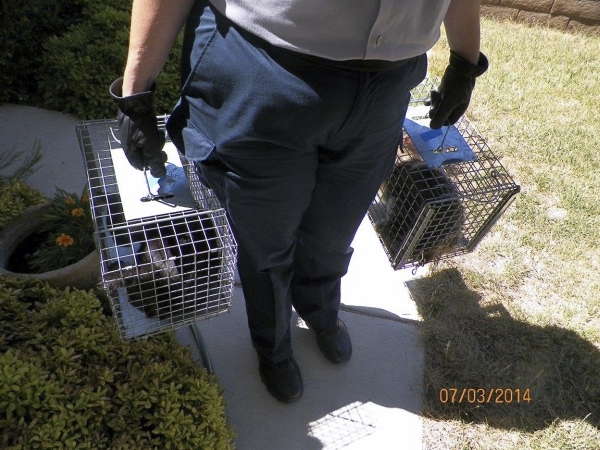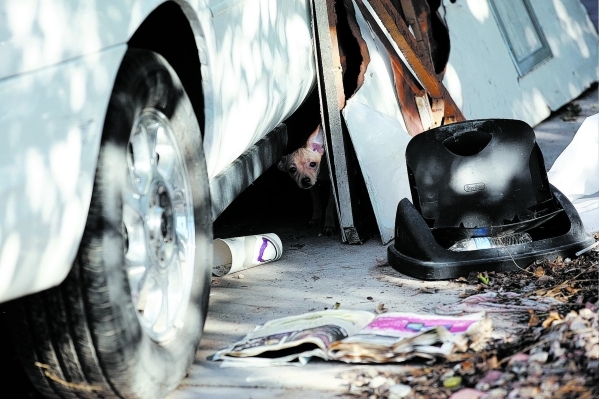Animal hoarding often leads to social isolation
Pet addiction or animal hoarding is one of the cases where it's very easy for a mental health problem to become a physical health problem.
"You can easily have dozens of cats in a home, and the owner isn't aware of the problems that they are creating for themselves," said Terrence Shulman, author of "Cluttered Lives, Empty Souls: Compulsive Stealing, Spending, and Hoarding." "The home can be in disarray — there could be feces all over, fleas, smells and other problems — a lot of these people are older and have weakened immune systems, and what they're breathing in can be a serious problem."
Shulman runs The Shulman Center for Compulsive Theft, Spending and Hoarding in Michigan (theshulmancenter.com), which has a national clientele. He noted that pet hoarding adds a layer of complication to an already difficult situation.
"People have enough problems getting rid of inanimate objects," Shulman said. "You can imagine how much more difficult it is with a living creature. A lot of times, in their mind, they're doing a wonderful thing taking these pets in because if they didn't, the animals would be malnourished or euthanized. The problem is that there's a mental illness, a disruption of thinking, and the animals are not being taken care of."
Oscar Sida, instructor and Human Services Program coordinator at UNLV, said the effect of the problem can exacerbate the root of the problem.
"It's not healthy for the animal, and it's not healthy for the individual," Sida said. "The unpleasant environment often leads to social isolation because most people don't want to be around 50 cats or dogs and the associated problems. In some cases, the individual's inability to connect with people leads them to seek company in pets. If you can't even tolerate your own species, that could be problematic."
Social anxiety can lead an already strained person to further disassociate themselves from human interaction in a situation that can become a vicious cycle.
"We all have trouble with interpersonal relationships," Shulman said. "We have our fears and anxieties, and pets are safer than people because they don't judge."
Pets may not judge, but they also can't replace meaningful human interaction.
"One thing I'm seeing more and more of these days is people trying to have their pets declared service animals so they can take them on the plane," Sida said. "There are individuals who need that — people with PTSD (post-traumatic stress disorder) for instance — who often find the distraction helps them deal with social anxiety. If you don't have that sort of issue, if you're just using the animal as a sort of security blanket or a way to avoid social interaction, you're doing the pet and yourself a disservice."
Both Sida and Shulman note that every individual is unique, and a treatment plan must be individualized for the patient.
"If it's not a problem for the individual, it's not our place to tell people how they should live," Sida said. "Our job is to find a way for people to live as well as they can on their own terms. The patient needs to know their expectations and verbalize them to the health care provider."
Clark County residents, including those in the cities of Las Vegas, North Las Vegas and Henderson, as well as in unincorporated Clark County, may have no more than three dogs and three cats over the age of 3 months at one residence without a permit.
Clark County no longer issues, or requires, animal licenses. All dogs, cats and ferrets within the unincorporated area of Clark County are required to have the following forms of identification: microchip device, current owner identification tag or rabies tag. Call 702-455-7710.
In the cities of Las Vegas, North Las Vegas and Henderson, all cats and dogs older than 4 months must be licensed. To report pet hoarding or review licensing in the city of Las Vegas, visit tinyurl.com/clvpetlic or call 229-6444. In the city of North Las Vegas, visit tinyurl.com/cnlvpetlic or call 702-633-1750. In Henderson, visit tinyurl.com/henpetlic or call 702-267-4970.
Spaying and neutering is mandatory in Clark County. Visit tinyurl.com/CCspayneuter.
— To reach East Valley View reporter F. Andrew Taylor, email ataylor@viewnews.com or call 702-380-4532.
Addiction Series
View plans to continue exploring the topic of addictions in Sin City in a series covering everything from alcohol and food to technology and shopping. Watch for the next Addiction Series story in the Nov. 5 issue, with a look at alcoholism.



















